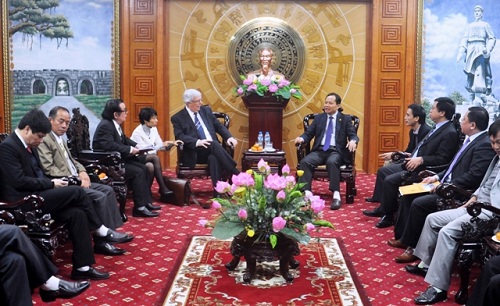Waste power plant nears go-ahead in Thanh Hoa

According to the Thanh Hoa Provincial People’s Committee, executives from Naanovo Energy visited the province in mid-December and discussed the investment with the local authorities.
Under Naanovo Energy’s plan, the company will invest $101 million to build a waste-to-energy plant on a 25-hectare site. The plant will be able to treat 191,700 tonnes of waste a year.
Nguyen Ngoc Hoi, Vice Chairman of the Thanh Hoa Provincial People’s Committee, said the local authorities had already prepared site clearance, water supply and transportation infrastructure for the project. But he noted Naanovo Energy needed to complete the usual administrative procedures and environmental impact assessment to gain an investment certificate.
Established in 2001 in Canada, Naanovo is a global clean energy company with roots in North America. Its purpose is to develop clean energy projects in regions of the world where the demand for energy far exceeds supply and where alternative energy, or clean energy, is the preferred solution for producing electricity. Over the years, Naanovo has expanded operations through concentrated solar power and waste-to-energy projects in the UK, Brazil, El Salvador, Guatemala, Uganda, Nigeria and Saudi Arabia.
If the project in Thanh Hoa is approved, this could be the second waste-to-energy plant in the Vietnam.
The construction of the first waste-to-energy plant in Vietnam began last September in Hanoi. It was built at the Nam Son Waste Treatment Complex in Soc Son district by a joint venture between Japan’s Hitachi Zonen and Hanoi Urban Environment Company. Once completed, the Hanoi waste-to-energy plant will provide the electricity for the whole Nam Son Waste Treatment Complex, as a measure to deal with the glut of waste in the capital.
Several private investors have proposed building renewable energy projects generated from solid waste in the country in recent years, but most of them have not been realised due to the lack of policies that would help guarantee the projects. Those include Australia-based Trisun International Development’s $400 million project and Vietnam Waste Solutions’ $400 million project in Ho Chi Minh City.
To encourage private investors to develop waste-to-energy plants in the country, the Vietnamese government this year also issued a decision providing a ground-breaking feed-in tariff for power suppliers of up to 10.05 US cents per kilowatt hour. This is more than 25 per cent higher than the 7.8 cent applicable to wind power projects.
What the stars mean:
★ Poor ★ ★ Promising ★★★ Good ★★★★ Very good ★★★★★ Exceptional
Latest News
More News
- Hermes joins Long Thanh cargo terminal development (February 04, 2026 | 15:59)
- SCG enhances production and distribution in Vietnam (February 04, 2026 | 08:00)
- UNIVACCO strengthens Asia expansion with Vietnam facility (February 03, 2026 | 08:00)
- Cai Mep Ha Port project wins approval with $1.95bn investment (February 02, 2026 | 16:17)
- Repositioning Vietnam in Asia’s manufacturing race (February 02, 2026 | 16:00)
- Manufacturing growth remains solid in early 2026 (February 02, 2026 | 15:28)
- Navigating venture capital trends across the continent (February 02, 2026 | 14:00)
- Motivations to achieve high growth (February 02, 2026 | 11:00)
- Capacity and regulations among British areas of expertise in IFCs (February 02, 2026 | 09:09)
- Transition underway in German investment across Vietnam (February 02, 2026 | 08:00)
















 Mobile Version
Mobile Version